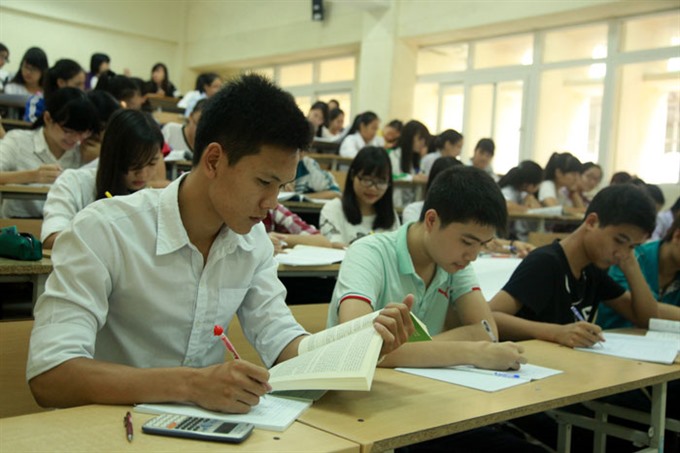 Opinion
Opinion

Professor Lê Kim Long, former dean of the
 |
| The government should have adopted some preferential policies for the students attending teacher training universities and colleges to bring them in line with the country’s market economy. — Photo kinhtedothi.vn |
Professor Lê Kim Long, former dean of the Education University, talks to the newspaper Kinh tế & Đô thị on the need to end the policy of free tuition for students at public teacher training institutions.
What are your thoughts on the proposal to abolish the policy of granting free tuition fees to students enrolled at all public teacher training institutions?
The policy to grant free tuition fees to students enrolled at all public teacher training institutions started in 1996 – a time when very few students wanted to become future school teachers. Thanks to that decision, many high school graduates with excellent grades enrolled in teachers’ training colleges or universities. This was a strong indication the policy was a success.
By now that policy has lasted 22 years and it is time to make a change. In my opinion, the life of such a policy should have been about 10 years only. And then the government should have adopted some preferential policies for the students attending teacher training universities and colleges to bring them in line with the country’s market economy.
I still remember in 2013 when a delegation from the National Assembly Committee for Youth, Young Pioneers and Children was on a working visit to my school. I asked Professor Đào Trọng Thí to end that privilege policy for students enrolled in teachers training universities/colleges. I told him that the policy was no longer attractive to the students as their study expenses were triple that of the school fees. But my proposal was rejected. It is now high time to abolish that policy. It even runs against the Government’s policy on educational renewal.
The phrase “educational renewal” means that the students must practice independence in their studies. Many students from poor families have to work to earn money to cover their study expenses. But many of them still have excelled in their studies. That’s why we now should abolish the free tutition granted to students registering in the teachers training institutions. This is one way to encourage the students to be more pro-active in their studies.
How do you respond to the proposal that the Government should lend money to students attending teacher training universities/colleges with preferential rates, and they will then pay back the debts after graduation?
Granting loans to students with low interest rates has been applied for many years already. But nowadays, banks are not interested in giving low interest rate loans to students as many graduates can’t find jobs to make enough money to pay back their debts. Furthermore, for those who find jobs, they don’t want to have their salaries be deducted by the banks for the debts they had borrowed when they were still students. Their main argument was that teachers’ salaries are very low! So it is my suggestion that the credit scheme should be granted to all students – whether they study at whatever university or college in the country. The only rule that should be applied is the maximum or minimum sum that a student can borrow.
So how should a policy to incentivise students to attend teacher training institutions be implemented?
In my point of view, after they graduate and become teachers, the preferential policy that they ought to enjoy is a high salary. Their salary should be higher than the salary of their peers working in other professions. However, I suggest that one of the best solutions is to shorten by a year the time after which they will get a pay raise. According to the Labour Code, all Government employees will get their pay rise in every three years.
Furthermore our economy has now switched to the market economy. So an employee’s salary, including the teacher, should be based on their work performance. This is an effective tool to encourage all employees to do their best to improve their work performance in order to gain a higher salary.
But for the case of teachers, don’t you think that Government should have a special policy for them?
Under the current law, in the first five years of teaching, the newly graduated teachers will receive an additional sum of money equal to one-year-loan that they have to pay back to the bank from the Government. So in the first five consecutive years, they will be able to pay back the bank’s debts that they had borrowed during their student years. For students didn’t take the bank credits, they will also enjoy the same amount as the students who had borrowed the money from the banks in the first five years of their teaching career.
Under the Decree 26/2015 CP, all universities are given autonomy on using their budget or on their regular expenditures through the use of the students’ tuition fees. The State budget will then only focus on the development of general schools. I’m confident that this policy will encourage talented students to enroll in teachers training institutions. — VNS




